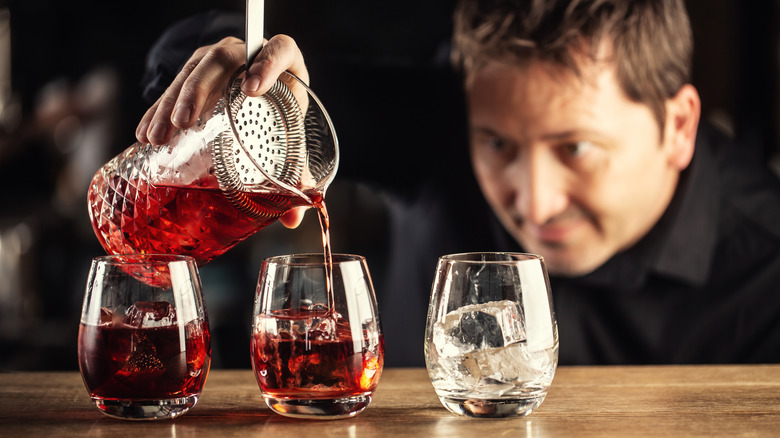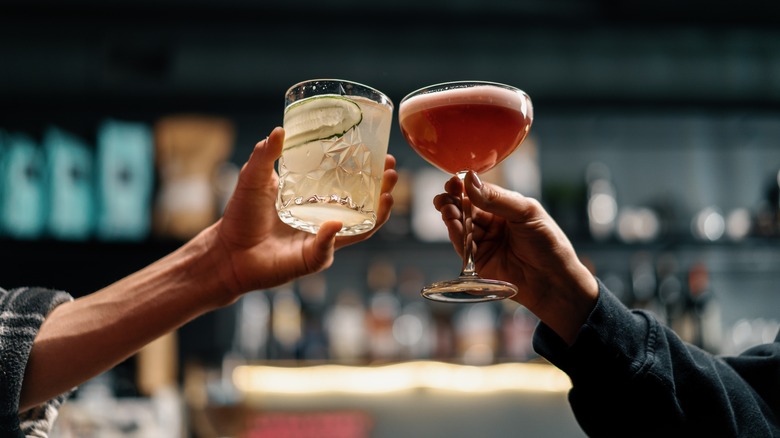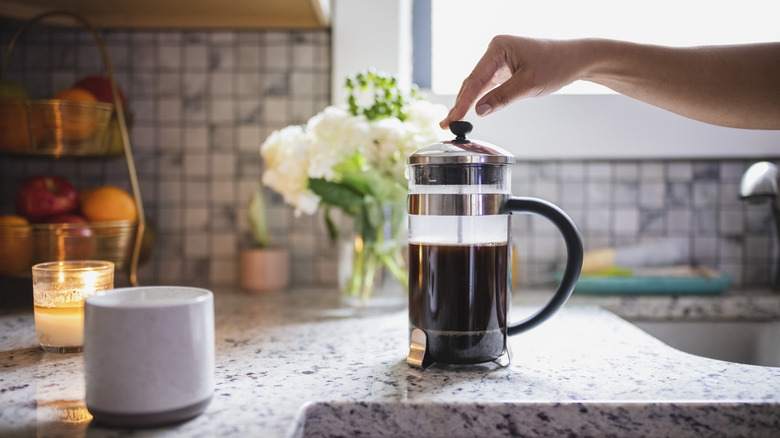Do You Really Need A Cocktail Mixing Glass In Your Bar Setup?
For drinks that don't require the aeration or intensity that a cocktail shaker provides, it's the perfect time to reach for a cocktail mixing glass instead. Often included in some of the best home bar cocktail sets, stirring a cocktail in one of these vessels yields effortlessly smooth and balanced drinks, so it stands to argue that it's a worthwhile investment for a home bar. To use a mixing glass, simply fill the cup with ice, pour in the liquid of a cocktail, stir in a consistent motion with a bar spoon, and strain the drink into a serving glass.
While some may think this simple vessel seems like a nonessential item, it actually makes more of a difference for cocktails than many might think, ensuring a consistent drink every time. Unlike other cups, cocktail mixing glasses are specifically designed to help bartenders seamlessly mix a drink. The bottom of this glass is heavy to keep the cup sturdy, and the body of the glass is a straight cylinder shape so you can consistently stir the drink with a bar spoon without hitting the sides.
Next, most cocktail mixing glasses are made of a special thick glass that helps keep the temperature of the drink inside regulated. This protects the liquid from interacting with the heat of your hand. Other mixing vessels don't have that some protection, and using those instead could lead to fast melting ice cubes or drinks that sweat prematurely. That said, while these glasses are nice to have, you don't necessarily need one — it's all about your drink preferences.
Why you might want to skip this tool for your home bar
The final benefit of using a mixing glass that we'll mention here is its spout. While you could mix drinks in an ordinary cup, when it's time to pour the liquid over ice, spills are imminent without the help of that handy spout. You won't have those same problems with a mixing glass.
Those are just a few of the benefits of mixing glasses, but hey, everything has its drawbacks, and when it comes to these vessels, there are a few to take note of. For starters, the downsides to a cocktail mixing glass are what you might expect. It's just one more dish to wash, and since this tool is technically a nonessential item, you might want to forgo purchasing one to save both time and money. Additionally, if you're someone who tends to drink cocktails that require a shake instead of a mix, this investment might not be for you. For reference, drinks that require mostly just spirits, such as a Manhattan or Negroni, should generally be stirred to help them retain their density. Alternatively, cocktails with more varied ingredients, such as a Margarita or Cosmopolitan, should be shaken. (And for all those shaking enthusiasts, here are 3 cocktail shakers home bartenders should know.)
So, while mixing glasses are nice to have, they're not technically required. Still, if you're serious about your home bar, you might want to grab one to continue crafting perfect cocktails.
Alternatives to a classic mixing glass
Whether or not you procure a cocktail mixing glass is up to you. Still, because the act of mixing a drink helps it achieve a balanced fusion of all the ingredients, not to mention consistency in temperature, it's worth finding some way to mix up your cocktail before pouring it over ice. So, if there's no mixing glass in your arsenal, opt to pour and stir a drink in a tall pint glass or the bottom of a French press instead. (Or any other tall, straight vessel that will hold all the liquid of your drink.)
For all those that who are on team mixing glass, know that there are options out there for every cocktail fan. For those that crave just an occasional stir, for example, a basic, classic mixing glass design would be best. Often affordable and plain, this barebones option will get the job done without any frills. For those that prefer more of an elevated mixing experience, styles like a Japanese mixing glass might be more up your alley. This option comes with all the bits and bobs, such as a sleek pour spout and intricate designs. While often more fragile and expensive than other options, passionate bartenders might appreciate the unique style of this glass.


